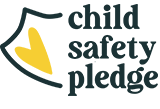- Require background checks. Ask your school if they do background checks or have any training for teachers, sports coaches, music teachers, teachers aides and volunteers.
- Demand strong protections. Require strong policies in place at any youth group or organization, including sports clubs and houses of worship, where you leave your child alone with an adult.
- Learn how to report. Be educated on how to report abuse in your state and the protocols of reporting.
- Understand the law. Be aware of state regulations regarding protection of children. North America has inconsistent laws and often lawmakers are not even aware of state regulations.
- Talk to your child. Have open dialogue with your children – talk to them about the dangers but listen to their concerns.
- Teach right and wrong. Talk to your child about the difference between good and bad secrets and explain the difference in touch.
- Be Alert. In high risk areas, never leave your child alone or with someone you do not trust. This is not just at home but also when you travel and stay in a hotel or in home-sharing accommodation.
- Watch for grooming. This does not just happen online. Be concerned about adults and much older children who want to spend considerable time with your child or are giving them gifts or constantly showering praise on them.
- Professionals know best. If you see a child in danger, call a hotline or local professional – it’s their job to check and help. Your call could change could be the trigger that prevents potential, current and/0r future abuse.
- Don’t just protect your child, protect all children. At Child Safety Pledge we beleive a true safety net is one that ensures that adults are taking positive actions when any child that is feeling unsafe or in danger.
